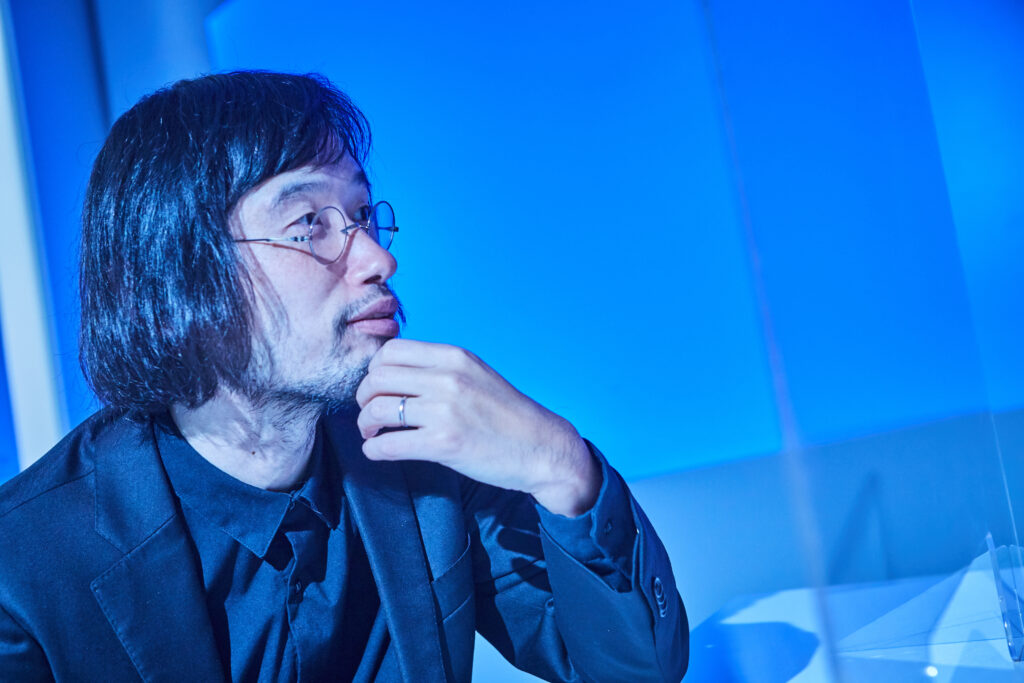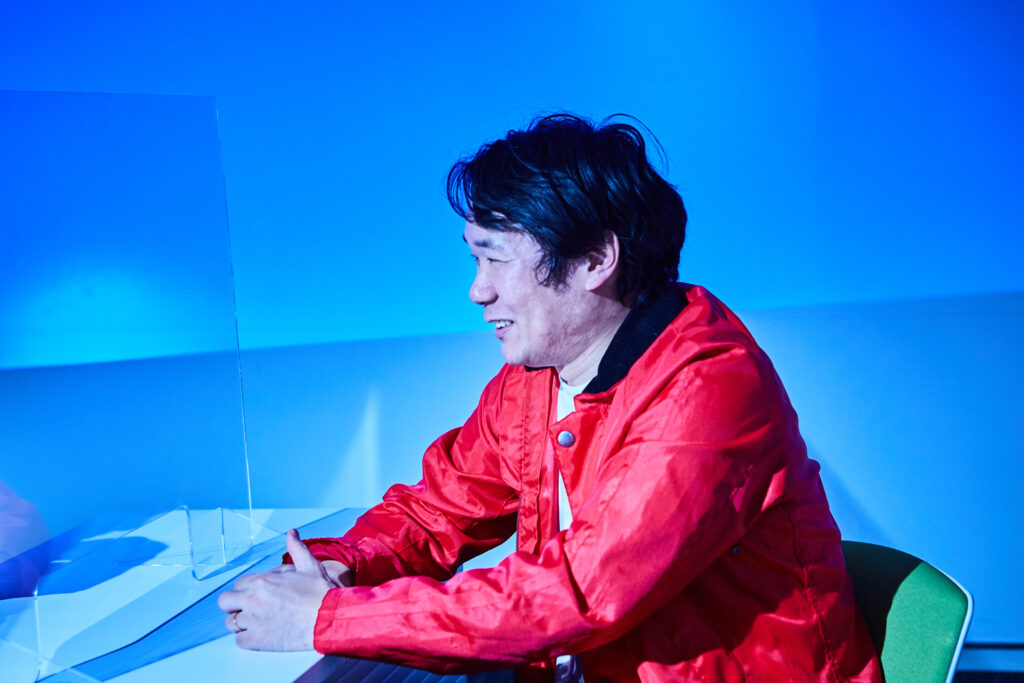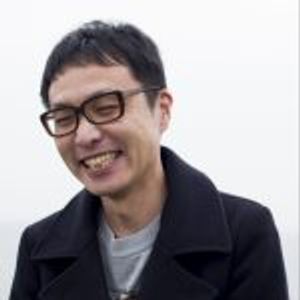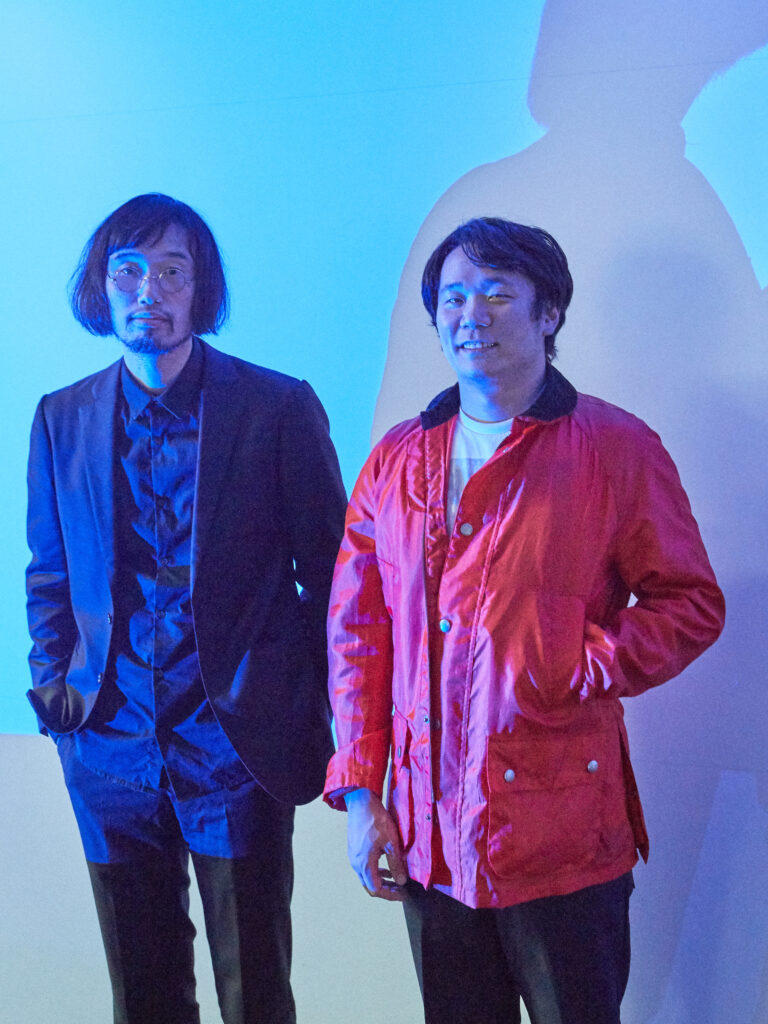
In 2014, Mikito Tsurugi wrote his autobiographical comic essay, Ano Koro. Danshi Ka Shimashi Monogatari, and it has recently turned into a film by the hands of the zestful movie director, Rikiya Imaizumi. The story takes place in the early 2000s, in Abeno Osaka, and authentically portrays the youthful days of young Tsurugi and his peers devoting themselves to the Hello!Project idols, such as Morning Musume and Aya Matsurura.
The movie, In Those Days, has garnered attention for Tori Matsuzaka playing the leading character, Tsurugi. Also, actors, who are active in various fields including Taiga Nakano, Takashi Wakaba, Tateto Serizawa, and Kokado Kentaro from the comedy-duo Lotti, who is landing his debut film role with this movie, are gathered in this film—Convincingly playing quirky characters.
How did the story turn into a movie, and what is the message intended to be delivered through the film? I spoke with Director Imaizumi, and the original author, Tsurugi to find out.
Tori Matsuzaka in the film looked exactly like Mikito Tsurugi
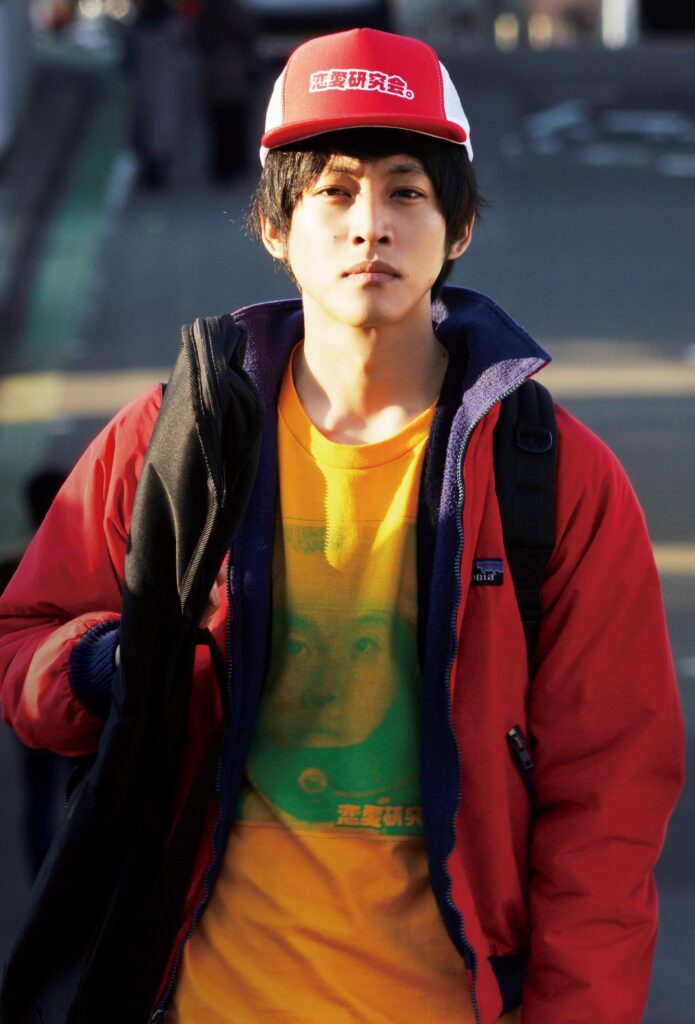
——First, please tell us your thoughts after you had watched the film.
Mikito Tsurugi: What I could say is that the director and scriptwriter—Masanori Tominaga—and the crew were showing reverence to the original story. There are cases where the original authors are unhappy with the film adaptations of their works—like Steven King—but that wasn’t the case for me.
——The film is nothing like Shining, though. [laughs]
Tsurugi: I mean, I didn’t think of wanting to redo everything like Steven King did. [laughs] In fact, they brushed up my work, which was quite hard to portray. I’m so grateful for that. That’s all it matters.
——I heard you were on the set quite often.
Tsurugi: I was. I went to the set casually. People kept asking me, “Are you coming tomorrow?” so, I was like “Sure, why not”—but afterwards I heard that the original authors don’t actually visit the set that often, and that’s when I started feeling embarrassed. [laughs] I was there merely because it was fun, but I guess it was a little odd.
Rikiya Imaizumi: If a legendary novelist or manga artist came to the set every day, it would’ve been an extraordinary mood. [laughs] But as Tsurugi wrote some parts of the dialogues, such as in the event scene, we were able to ask him like, “do you think this part is weird?” and confirm with him when we were struggling during the shoot—so he was more like a director than just an author.
Tsurugi: I was obviously the only person who knew about Hello!Pro at that time and my friends—so the actors and Director would ask me questions and I would be there to answer.
——Also, Tori Matsuzaka, who played your role in the movie, was studying your mannerism when you were there.
Tsurugi: Yeah, I heard Matsuzaka saying so.
——Most people who saw the movie say that Mazusaka in the film looks exactly like you.
Tsurugi: It’s weird for me to admit but yes, he looks just like me. [laughs] I see reviews saying, “Tori Matsuzaka was creepy,” but that’s simply because I was a creep. The film isn’t representing the general fans of Hello!Pro, and it’s essentially portraying me. The more reviews I see about Matsuzaka’s acting, the more I feel prodded. [laughs]
Imaizumi: When people talk about Tsurugi and Matsuzaka’s resemblance, they often make fun of their looks, but I think their personalities are also alike.
Tsurugi: Seriously!?
Imaizumi: Maybe, Tsurugi is a bit more mature? That’s what I think.
Tsurugi: Yeah, I agree. Matsuzaka isn’t that handsome at his core, if you know what I mean.
Imaizumi: In real life, Matsuzaka is a normal person. Like, he’s nonchalant. In a good way.
Tsurugi: He seems to not care about how people see him. So, that’s why he could insouciantly play a character like me. I think Matsuzaka is identical to me in the film, but I see the friends as the characters of the movie.
Difficulties of film adaptations
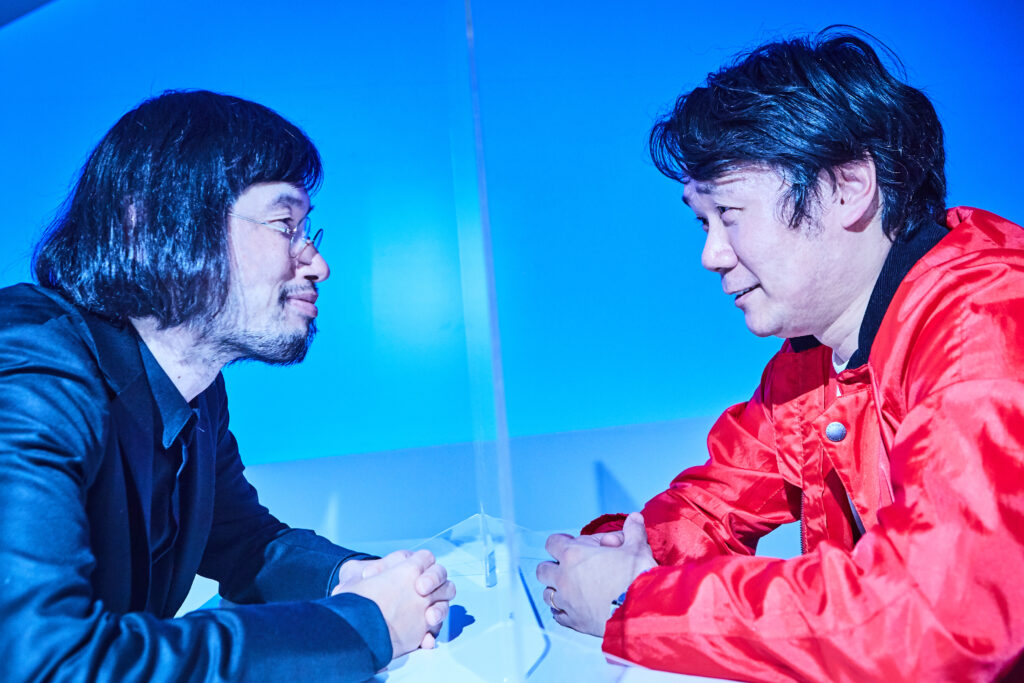
——Director Imaizumi, you were saying that it took time to imagine and figure out which part to assign to each actor.
Imaizumi: I didn’t have trouble for the conspicuous characters like Tsurugi and Kozumin, however, initially with the characters like Nishino, Ito, Nakauchi and Robi, the actors were all talented that I had a hard time assessing who would be suitable for the respective part—Like, I could imagine the actors playing two different characters. But looking at it being finished, I can’t think of these actors playing other parts anymore, so I guess that means the casting was done right. Since we couldn’t employ more actors, we had to have one person conveying multiple characters who ultimately existed in the original story. In the film, there is a poster that says, “NO MUSIC, NO IDOL!”—Tsurugi drew every single person on the poster, including those who couldn’t have its own character in the film, so I’m glad that we had the poster.
Tsurugi: Tower Records requested me to draw all the original characters on the poster.
Imaizumi: Generally speaking, although it would be nice to have all the original characters in the film, it’s imperative to organize the number of characters, so that it wouldn’t get congested.
——When I read the original story, I’ve realized that in the film, it’s not only the characters, but there are multiple events conveyed into one sequence—I was once again impressed by the script. How did the communication go with Masanori Tominaga?
Imaizumi: First, Tominaga wrote the overall structure and we began from there. Not only for this film, but I usually don’t write scripts for works that have their originals. I think the skills to sift the important parts and rebuild the story are different from creating stories from scratch. I personally cherish small details that if I were to write a story, it gets redundant as I’m not capable of taking out precise descriptions. Even when putting two stories into one, I dither with thoughts like, “if I take this part out, the transition between this scene to the next would be awkward,” or “if I combine these parts into one, the original author might get disappointed” —and I end up doing nothing to the stories. However, Tominaga would do that job for me, and we would brush up together afterwards. Initially, Tsurugi’s unsuccessfulness was conveyed more precisely—There were scenes with him at his workplace. Yet, we looked at the overall mood and balance, and decided to cut those moments.
Tsurugi: You take great care of the precise details in the story.
Imaizumi: I mean, who wouldn’t be interested in the fact that Nishino has become a quiz king, after all. [laughs] I briefly thought about adding small bits of each member’s current life—just like, Stand by Me. [laughs] But if we did so, it would just be superfluously long. Also, realistically speaking, I wasn’t quite sure how to portray a quiz king scene. But it may have been funny if we did, you never know.
Tsurugi: It might have been possible if it were a Netflix drama series of 10 episodes. [laughs]
Imaizumi: That’s true. But also, it was quite a challenge to determine how far we should portray Tsurugi’s life in Tokyo after moving away from Osaka—There’s his band, Arakajime Kimerareta Koibitotachi E, and him being the manager of Shinsei Kamattechan, and all other things…you know. If we wanted to convey him working at the entertainment office, we would probably have to make a scene of him being present at his artist’s interview or something like that—but it made me wonder, “Would that really show his attitude towards work?” Then, as I was pondering and location scouting, the ideas started coming together.
The director, Imaizumi’s meticulous details that cannot be missed
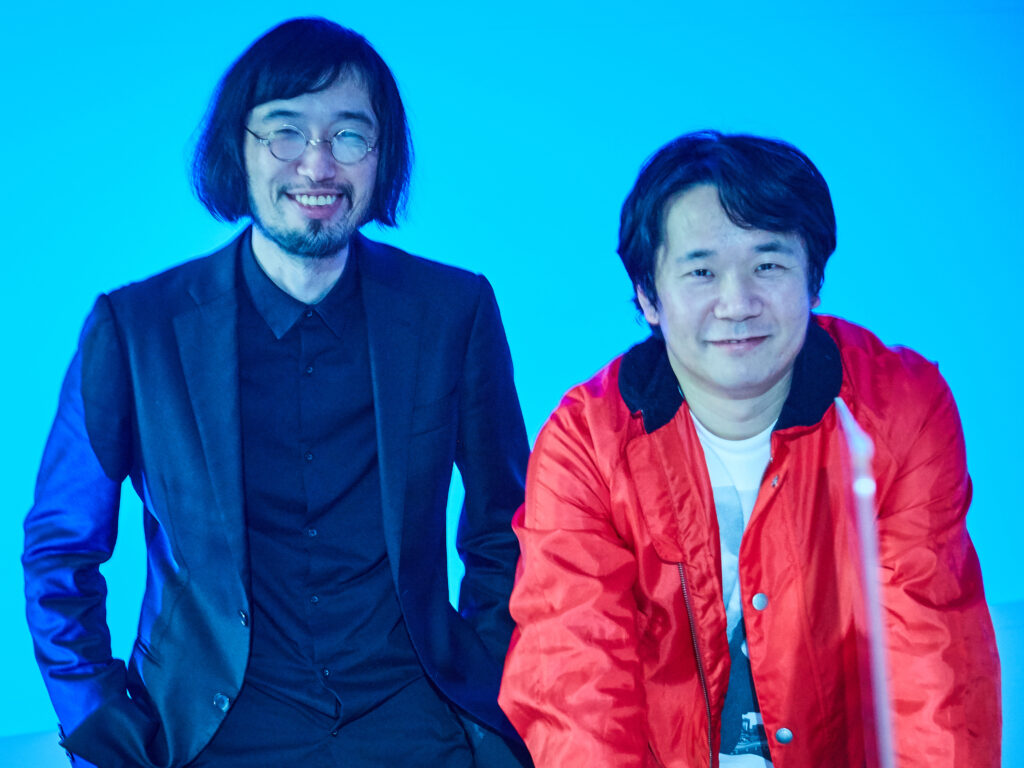
—— I think one of the highlights of the movie is the tiny details. In Tsurugi’s room, there is a handwritten paper that says “Kosho-dattesa (Says it’s broken)” stuck to the AC, which I assume is inspired from the scene in Aya Matsuura’s music video: “Yeah! Meccha Holiday.”
Tsurugi: That’s right, bravo. [laughs]
Imaizumi: I’m happy that you’ve noticed. I think not many people would find that the first time they see the film. It was also in the original story.
Tsurugi: Yes, it was casually written. Back when I wrote the story, I included that detail hoping for someone to notice that it’s the same as in “Yeah! Meccha Holiday.” You also need to watch the video very carefully.
Imaizumi: We could’ve taken that part out when editing the scene, if we wanted to, and in fact, it was not going to be used—but I remember suggesting that even though it’s not a crucial detail, it would be better to show a moment of the room turning into Ayaya’s room from the video.
Tsurugi: The fonts were similar, too. [laughs] I think, you will discover more details if you watch the film multiple times.
——I saw some moments imbued with Imaizumi’s style. Like in the scene where Tsurugi visits his friend’s house for the first time, it made me wonder which parts of the scene were in the script and what not, and I thought that’s very much your style—It didn’t move on to the next scene for a while, and there were moments in between where the actors seem to be their true selves.
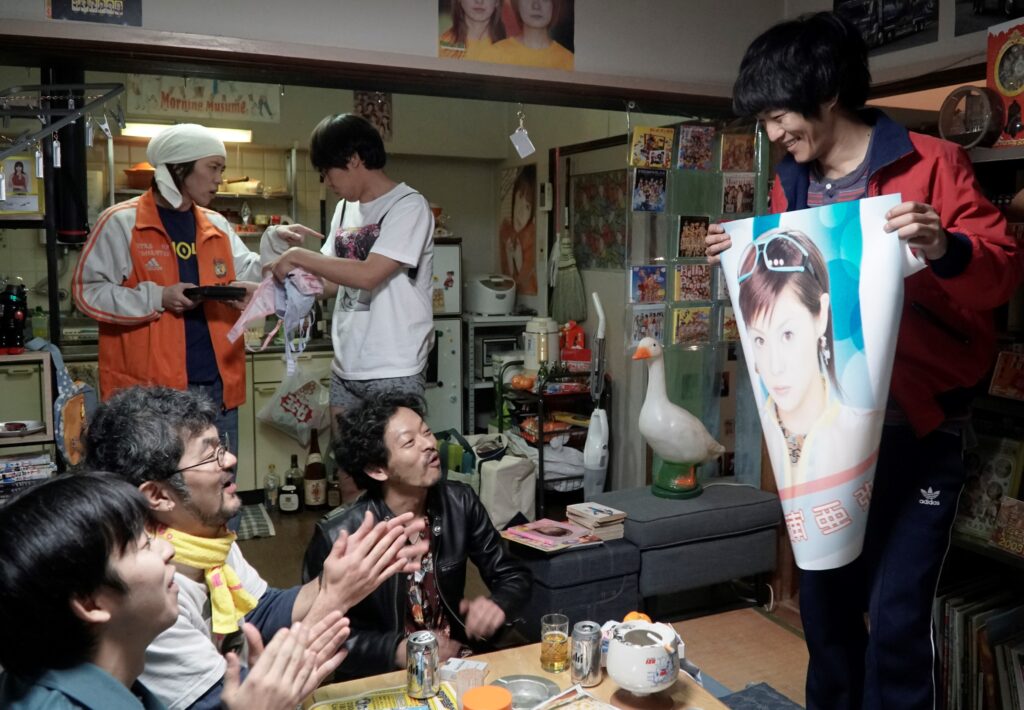
Imaizumi: Basically, there was a script, but the tiny bits in the scenes were improvised by the actors. Instead of giving them only one-shot, we did rehearsals, and during then, the actors would come up with ideas and we incorporated the ones that made us say, “That’s a fun idea.” Also, the stew moment was shot without deciding how to end the scene.
——Are you seeking to capture unexpected moments?
Imaizumi: Yes, but also like what you said earlier, that you couldn’t tell “which parts were in the script and what not,” I try to make the scenes realistic as possible. That way, it becomes less fake. However, we need to keep in mind that if the actors step out too far and act too naturally, they would not be the characters anymore. The authentic scenes can be achieved by multiple takes, but sometimes, they could only be captured by one-shot. I sometimes randomly add a line in only one of the actors’ script. I didn’t do it this time, but I would do it when I want the actors, who are well prepared and getting into the character too much, to break out of their shells. I do it when they aren’t doing anything beyond what’s written in the script.
Through In Those Days, I want more people to find out about the current Hello!Pro

——I’d like to hear about the idols and fans, who are the main parts of the film.
Imaizumi: Tsurugi, was there something you were into, before you were obsessed with Ayaya?
Tsurugi: Music in general, of course, but I also loved gravure idols.
Imaizumi: Ah, right. Gravure idols are my favorite too, but I’ve never said it out loud. I’m shy about it. There were couple gravure idols I liked—Sayuri Anzu, to name one.
Tsurugi: I didn’t hide about it that much, and I’d say Yuuka and Kaori Manabe were my favorites. I used to check them out a lot. How nostalgic.
——You see, people’s preferences change over time—And, there’s this inevitable sadness of acknowledging their level of passion dwindling.
Tsurugi: I feel you. It’s sad from the perspective of people whose level of passion is consistent—They can’t bear to see others losing interests in what they used to pursue fervently together. But the truth is, people’s preferences are fluid. Even looking at people around me, there are some who suddenly became obsessed with Hello!Pro, and some who started getting into NiziU.
Imaizumi: I think, the reason why they start parting from what they used to like, is because the level of their passion was to the extreme. Since they felt so attached to it, they probably can’t sustain the level of passion when it’s evolving too much. It’s not that they are taking the changes in a negative way, but for instance, they just can’t keep up when there are too many changes in the members of the group—If you were fond of the group, but your favorite member graduates, that could consequently make you lose interest in it.
——I’m sure most people have experienced their hearts drifting further away from something they’d once loved, so in that sense, I think a lot of people would resonate with the story even if they were never into Hello!Pro.
Imaizumi: If you read the original story, you can tell that it only depicts a piece of Hello!Pro’s history, and we were afraid that the viewers would think, that was the heyday of Hello!Pro—We wanted to avoid that from the very beginning. In the actual story, the characters part ways and Tsurugi moves to Tokyo. It’s the same in the film and we don’t play much Hello!Pro’s music in the second half—so, we were worried that people would misconstrue that Hello!Pro from 2008 to 2010 isn’t that good. Also, we show Kozumin listening to Perfume around that time, which could possibly lead to misunderstanding.
Tsurugi: I agree.
Imaizumi: Also, I was extremely concerned with the title, In Those Days—considering the risk of being misinterpreted as “the past was great,” especially by people like me, who were never a part of the culture or an Otaku.
——But it is a film that highlights the greatest time of the characters’ lives.
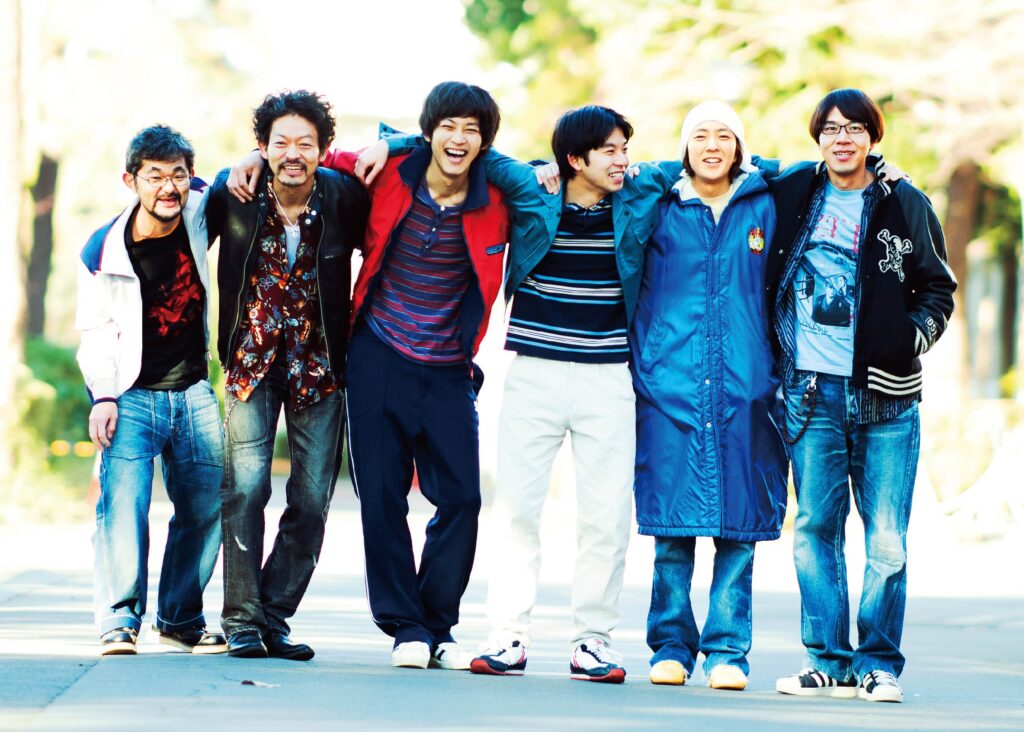
Tsurugi: I hope people take it that way.
Imaizumi: Also, I simply hope that the film inspires people to check out the current Hello!Pro live shows. I wouldn’t say that they should see the real performance to understand the story more, but we purposely didn’t show their live performance in the film, because we wanted to induce the viewers to see it for themselves. By the way, I’ve been watching Hello!Pro’s contents on YouTube lately. If you look at the evolution of the group, the current members are completely different from before, and it’s quite hard to believe that it’s the same group. The more I watch, the more I’m awed by [Sayumi] Michishige, and discovering new things like, the average age of Morning Musume has dropped significantly at one point due to a new member joining. As you see, I’m becoming savvier. [laughs] I would watch Maki Goto collaborating with Yuki Kashiwagi on Youtube, and delve in further—eventually, I would find a video of Rino Sashihara, who is a Hello!Pro Otaku, collaborating with Minami Minegishi, and watch it ‘till the morning comes. [laughs] After I enjoy watching “=LOVE” video, I would go back to Hello!Pro videos and be reminded how great BEYOOOOONDS is.
——You’re finally getting into it. [laughs]
Imaizumi: I know it’s strange. Like, it’s odd the way I got into it. Recently, I was invited as a guest speaker for the promo event of Noboru Kodera-san.
——Is that the film starring Haruka Kudo, who is the former member of Morning Musume?
Imaizumi: Yes. I was aware that she was already the ex-member of Morning Musume when she was casted for the morning superhero show, Kaitou Sentai Lupinranger VS Keisatsu Sentai Patoranger, but recently, when I was watching some past programs, I found out that she was still 13 years old back then—that astounded me like, “What!?” [laughs] I apologize in advance if I disappoint anyone, that a person with such poor knowledge of the idol culture was making the film—but in retrospect, I was diligently studying more about the time of the setting, and there are more things I’m discovering about the idol scene now.
——Like you, Director, I’m sure there will be more people checking out the Hello!Pro archives.
Tsurugi: I hope so. That’s everything I could ask for.
——About 10 years ago, I remember Tsurugi declaring in the blog, “Right now, the person I should support is Ayaya.” One thing led to another, and eventually, director Imaizumi decided to make the film, which became the biggest support for her—I was genuinely amazed by that.
Tsurugi: That’s true. [laughs] Back then, I was actively trying to encourage Aya Matsuura to make a comeback. For example, I visited her agency with a proposal. Unfortunately, it didn’t work out, but at least, I was able to support her in a different way.
Imaizumi: I was only contributing to what was already there, but what an incredible consequence. I’m not the one who wrote the original story, and the story was provided to me. I’m fascinated with the fact that Hello!Pro has established a long history. You hear people talking about the rumor of Maki Goto having beef with Ayaya—I think it’s interesting how they were the center of talks. …Regarding our earlier conversation, I might be the first person to be influenced by the film to check out and learn more about Hello!Pro. [laughs]
Rikiya Imaizumi
Born in 1981, in Fukushima. He debuted as a feature film director in 2010 with the film, Tamano Eiga. In 2013, he was awarded for Best Director for the film, I Catch a Terrible Cat, at the Transylvania International Film Festival. In the following year, his movie, Sad Tea, premiered and earned great reviews. His other works of feature films include, Our Blue Moment (2018), Just Only Love (2019), Little Nights, Little Love (2019), mellow (2020), and his (2020.) In 2021, other than In Those Days, a film which entirely takes place in Shimokitazawa, starring Ryuya Wakaba, Machino Uede, is scheduled to be premiered on April 9th.
Twitter:@_necoze_
Mikito Tsurugi
Born on May 7th, 1979 in Niigata. He is a mangaka and the bassist of Arakajime Kimerareta Koibito Tachi E. He also worked at PERFECT MUSIC and done management for Shinsei Kamattechan and GEKITETSU. He is now a manga columnist whose works are published in various websites, and gaining attention from his wide activities, not limited to music, but in a variety of fields. In 2014, he married the essayist, Kamiko Inuyama and won the SHUFUNOTOMO award in 2018. In December 2020, he published his new comic book, Bokurano Kagayaki Hello-Ota Jinsei Sanka (from EASTPRESS.)
Twitter:@tsurugimikito
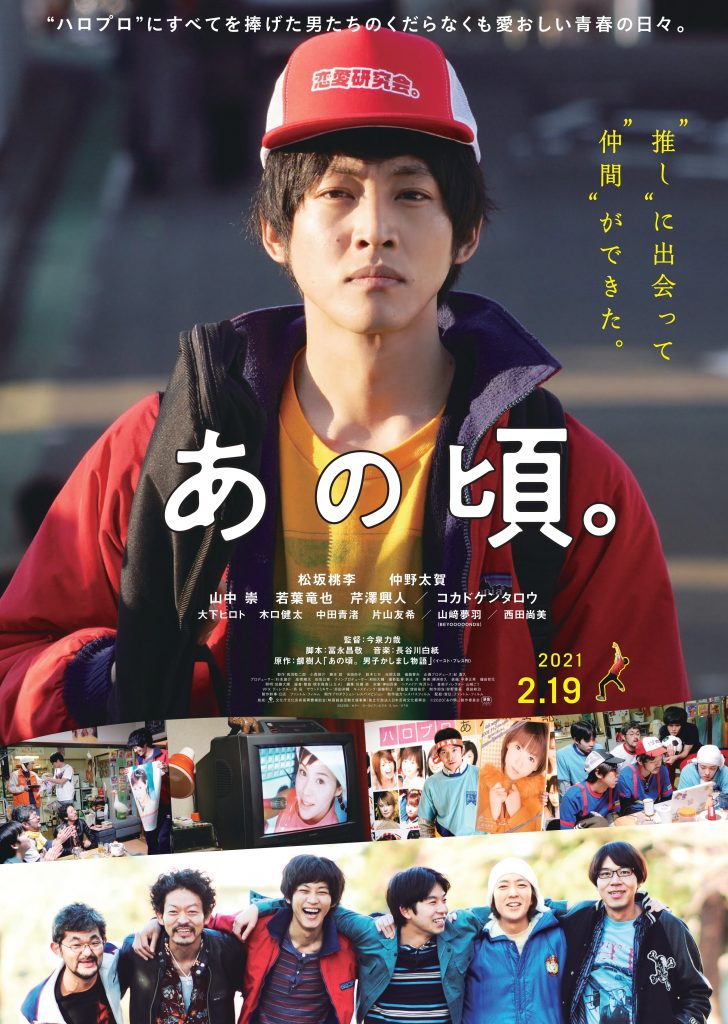
The movie, In Those Days
Director: Rikiya Imaizumi
Script: Masanori Tominaga
Starring: Tori Matsuzaka, Taiga Nakano, Takashi Yamanaka, Ryuya Wakaba, Tateto Serizawa, Kentaro Kokado, and others
Playing in TOHO Cinemas Hibiya and other theatres from February 19th, 2021
https://phantom-film.com/anokoro/
Photography Kazuo Yoshida
Translation Ai Kaneda

